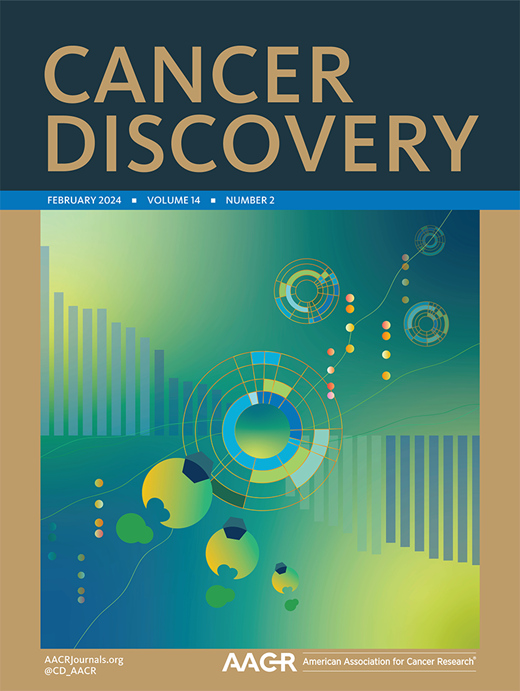人源化cd36阻断抗体PLT012可有效释放抗肝癌和肝转移的抗肿瘤免疫
IF 33.3
1区 医学
Q1 ONCOLOGY
引用次数: 0
摘要
肿瘤细胞发展出多种策略来逃避免疫监视,其中一种策略涉及改变肿瘤微环境的代谢状态。为了应对肿瘤微环境中的代谢应激,一些肿瘤浸润免疫亚群上调CD36以吸收脂质。这导致抗肿瘤免疫受损,因为肿瘤内调节性T细胞表现出更高的存活率和抑制活性,而CD8+ T细胞更容易发生铁凋亡和衰竭。在这项研究中,我们开发了一种人源抗CD36 IgG4抗体PLT012,该抗体针对CD36的脂质结合结构域,具有良好的安全性和在小鼠和食食猴体内良好的药动学特征。PLT012单独或联合PD-L1阻断或标准护理免疫治疗可在免疫治疗敏感和耐药的肝细胞癌(HCC)中产生强大的抗肿瘤免疫。值得注意的是,PLT012还能在体外重新编程人类HCC的免疫景观。我们的研究结果提供了概念验证证据,证明PLT012在HCC中重新编程抗肿瘤免疫,将其定位为靶向CD36的一流免疫疗法。意义:尽管免疫检查点抑制剂等癌症免疫疗法取得了成功,但由于肿瘤中的代谢限制,许多患者仍未能表现出显著的应答。PLT012通过靶向代谢途径重编程肝癌和肝转移的免疫景观,恢复抗肿瘤免疫,具有影响未来HCC免疫治疗的潜力。本文章由计算机程序翻译,如有差异,请以英文原文为准。
PLT012, a Humanized CD36-Blocking Antibody, Is Effective for Unleashing Antitumor Immunity Against Liver Cancer and Liver Metastasis
Tumor cells develop various strategies to evade immune surveillance, one of which involves altering the metabolic state of the tumor microenvironment. In response to metabolic stress in the tumor microenvironment, several tumor-infiltrating immune subsets upregulate CD36 to take up lipids. This leads to impaired antitumor immunity, as intratumoral regulatory T cells exhibit increased survival and suppressive activity, whereas CD8+ T cells become more susceptible to ferroptosis and exhaustion. In this study, we develop a humanized anti-CD36 IgG4 antibody, PLT012, against the lipid-binding domain of CD36 with excellent safety and favorable pharmacokinetic features in mice and cynomolgus monkeys. PLT012 alone or in combination with PD-L1 blockade or standard-of-care immunotherapy results in robust antitumor immunity in both immunotherapy-sensitive and -resistant hepatocellular carcinomas (HCC). Notably, PLT012 also reprograms the immune landscape of human HCC ex vivo. Our findings provide proof-of-concept evidence that PLT012 reprograms antitumor immunity in HCC, positioning it as a first-in-class immunotherapy targeting CD36. Significance: Despite the success of cancer immunotherapies, like immune checkpoint inhibitors, many patients still fail to demonstrate significant responses because of metabolic constraints in tumors. PLT012 rejuvenates antitumor immunity by targeting metabolic pathways to reprogram the immune landscape of liver cancer and liver metastasis, with potential to influence future HCC immunotherapy.
求助全文
通过发布文献求助,成功后即可免费获取论文全文。
去求助
来源期刊

Cancer discovery
ONCOLOGY-
CiteScore
22.90
自引率
1.40%
发文量
838
审稿时长
6-12 weeks
期刊介绍:
Cancer Discovery publishes high-impact, peer-reviewed articles detailing significant advances in both research and clinical trials. Serving as a premier cancer information resource, the journal also features Review Articles, Perspectives, Commentaries, News stories, and Research Watch summaries to keep readers abreast of the latest findings in the field. Covering a wide range of topics, from laboratory research to clinical trials and epidemiologic studies, Cancer Discovery spans the entire spectrum of cancer research and medicine.
 求助内容:
求助内容: 应助结果提醒方式:
应助结果提醒方式:


